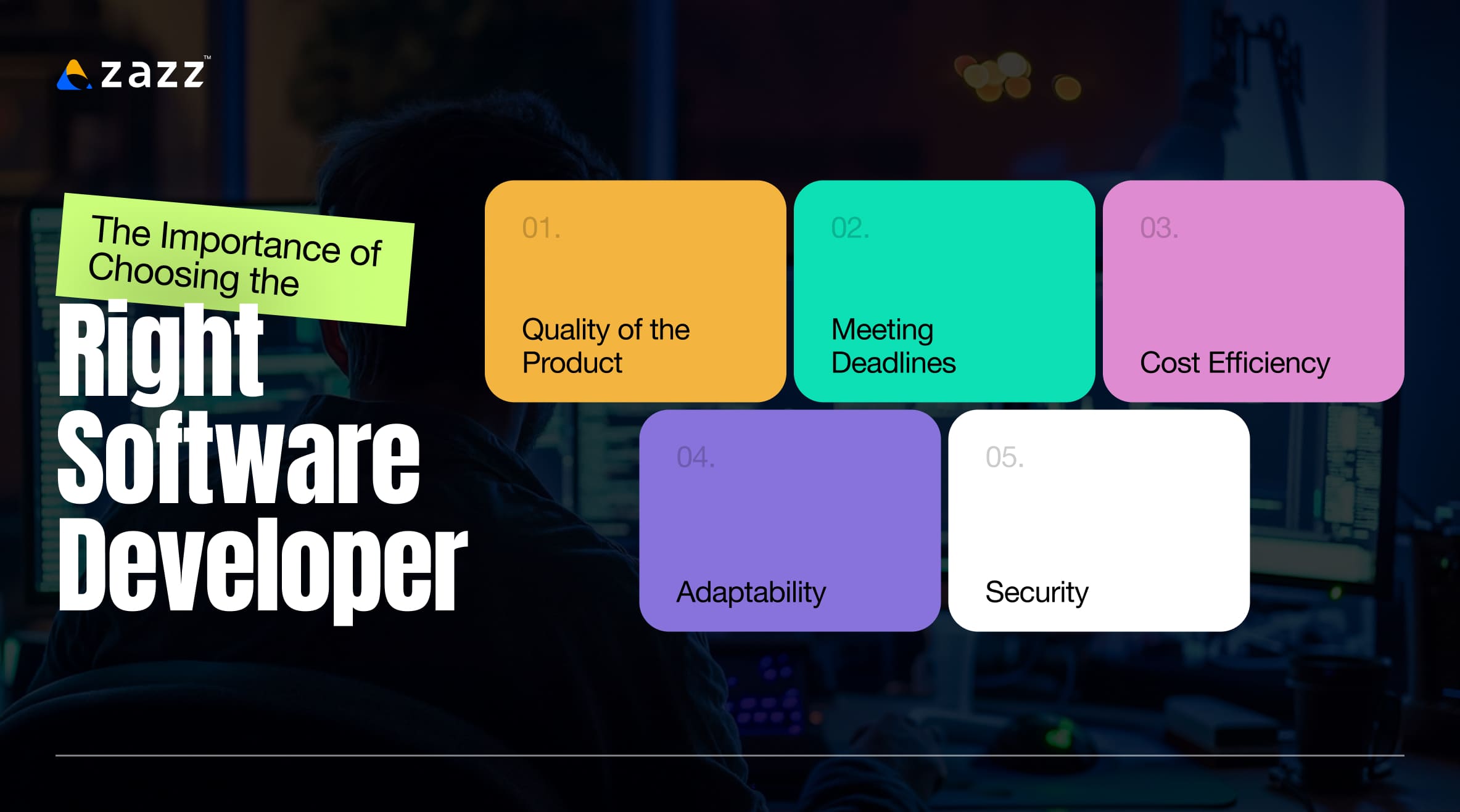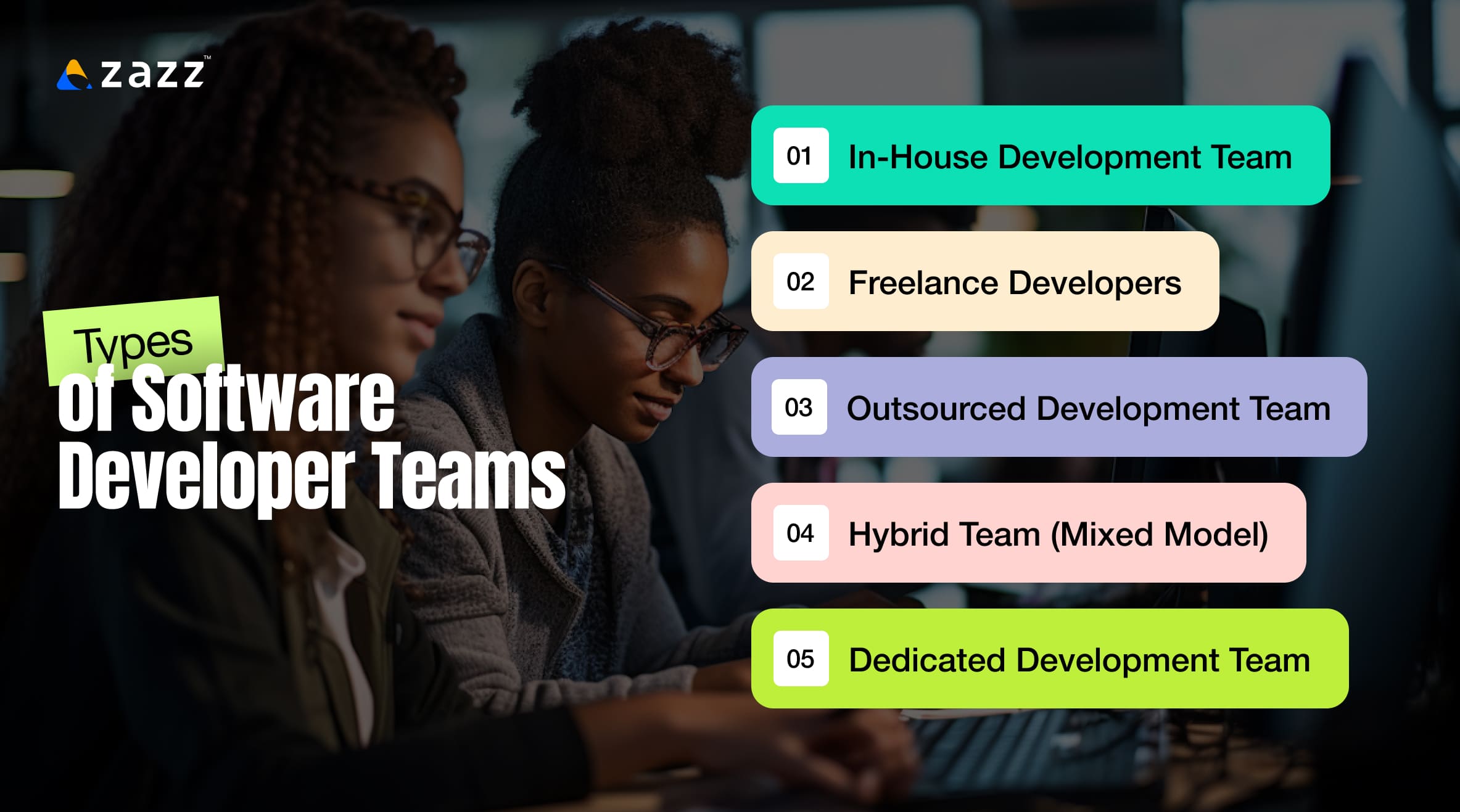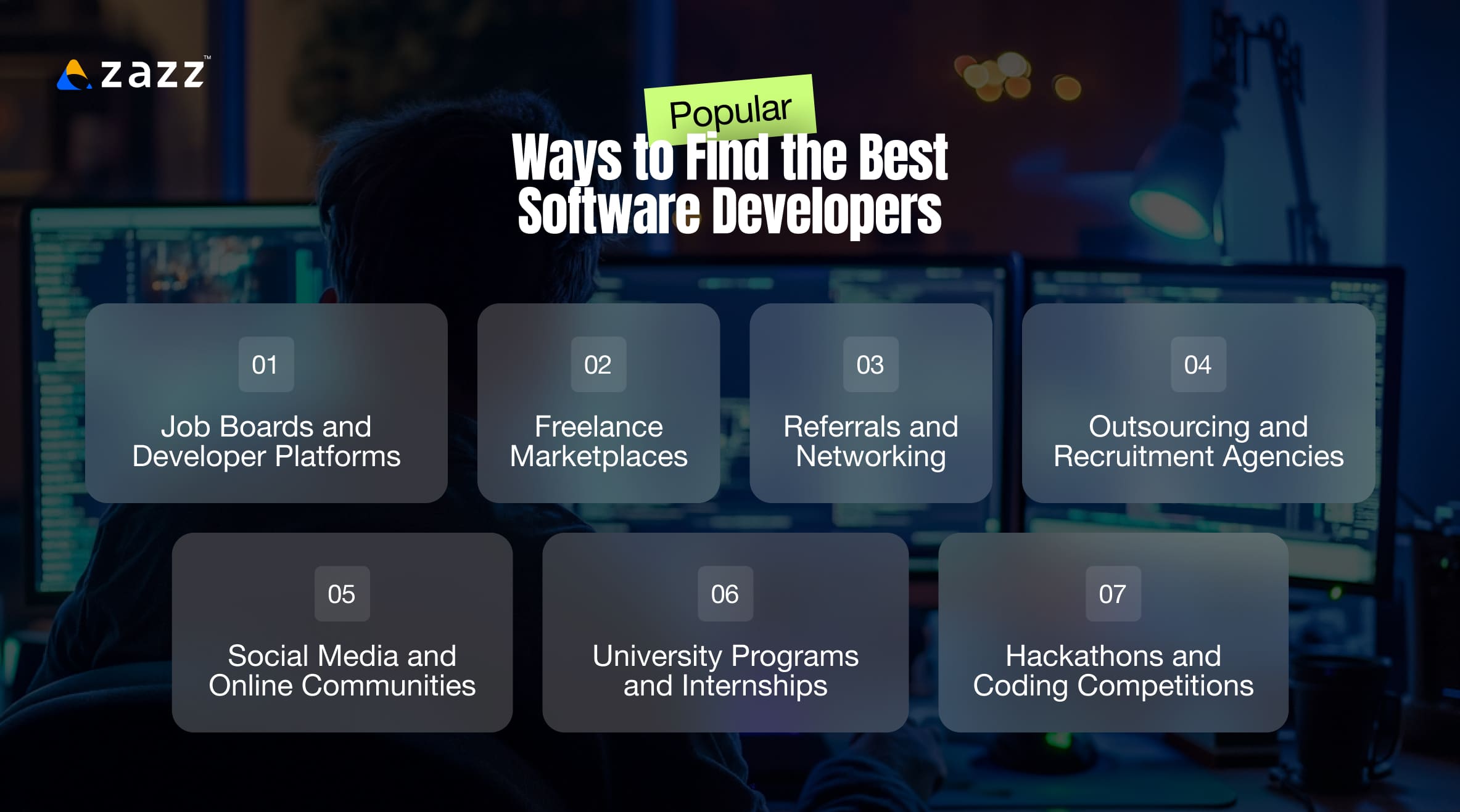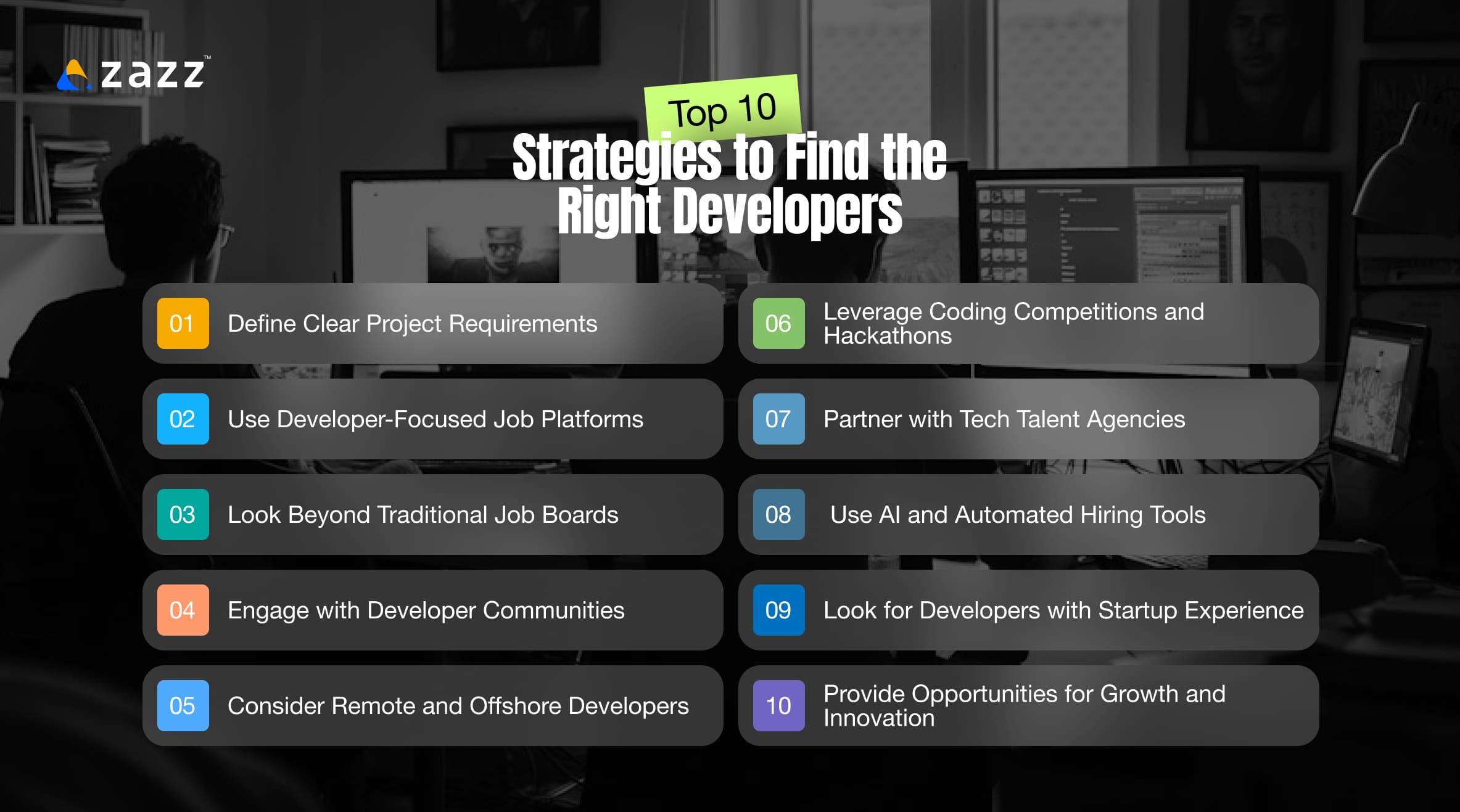
As the business landscape continues to evolve in 2025, the need for talented developers is more pressing than ever. Whether you’re looking to create a cutting-edge mobile app, develop an innovative web platform, or build software solutions that transform your industry, finding the right developers is essential. However, the process of finding developers is not always straightforward. In fact, many businesses struggle with the challenge of hiring top-tier developers who can meet their specific needs.
So, how do you find the best developers for your business in 2025? Here are the top 10 strategies to help you successfully find, recruit, and hire the right developers.
The importance of choosing the right software developer

Choosing the right software developer is crucial because they will play a significant role in determining the success or failure of your project. A skilled developer has the technical expertise and problem-solving ability to bring your ideas to life, but more importantly, they ensure that your software functions efficiently, is secure, and meets the needs of your users. On the other hand, hiring the wrong developer can lead to costly delays, a product that doesn’t perform as expected, or even a complete project failure.
Here are some of the key reasons why it’s so important to choose the right software developer:
- Quality of the Product: A skilled developer ensures that the software is of the highest quality—efficient, scalable, and free from bugs. They write clean, well-documented code that’s easy to maintain and upgrade in the future.
- Meeting Deadlines: A competent developer can manage their time effectively and contribute to meeting project deadlines. This is critical for keeping your business on track and within budget.
- Cost Efficiency: Choosing the right developer prevents you from spending additional resources on fixing errors, refactoring code, or extending timelines due to lack of expertise.
- Security: Developers are responsible for making your software secure. Poorly written code or negligence can lead to vulnerabilities, risking both your data and that of your users.
- Adaptability: The right developer will be adaptable to changing requirements, flexible in solving problems, and proactive in suggesting improvements to make the product better.
Build your dream team with right developers from Zazz– a leading staff augmentation company with Top 1% vetted tech talent across the globe.
Related reading: Tech Recruiting Guide: 10 Tips to Hire Tech Talent
Types of Software Developer Teams

When embarking on a software development project, one of the most crucial decisions you’ll make is choosing the right type of development team. The structure of your team will largely depend on the scale of your project, the technologies required, and your business objectives. Different team models come with their own sets of advantages and challenges. From the flexibility of freelance developers to the stability of in-house teams, understanding these various team structures can help you select the right approach for your needs. Here, we’ll explore the different types of software development teams to consider, each designed to address specific business needs and project requirements.
1. In-House Development Team:
- An in-house team consists of developers who work directly within your company. This type of team is ideal for companies that have long-term development needs and want full control over the development process.
- Advantages: Close collaboration, better communication, deeper understanding of the company’s culture and objectives.
- Disadvantages: Higher costs, long recruitment cycles, and the challenge of maintaining team expertise.
2. Freelance Developers:
- Freelancers are independent contractors who work on a project basis. This team structure is ideal for short-term projects or when you need specific expertise.
- Advantages: Flexibility, cost-efficiency, and access to a wide pool of talent.
- Disadvantages: Less control over the process, communication challenges, and potential quality issues if not properly vetted.
3. Outsourced Development Team:
- IT Outsourcing involves hiring developers from another company or from an offshore team. This model is often used when you need to save costs or want to leverage expertise that might not be readily available locally.
- Advantages: Cost-effective, access to a global talent pool, and faster recruitment.
- Disadvantages: Potential language barriers, time zone differences, and less control over the quality and process.
4. Hybrid Team (Mixed Model):
- A hybrid team combines in-house staff with freelancers or outsourced developers. This model allows for flexibility in scaling up or down based on the project’s needs.
- Advantages: A balance between control, flexibility, and cost-efficiency.
- Disadvantages: Managing a hybrid team can be complex, requiring careful coordination.
5. Dedicated Development Team:
- A dedicated team is an extension of your in-house team but is located externally. This team works exclusively on your project and is often used for large, long-term projects.
- Advantages: Full commitment, specialized expertise, cost-efficiency, and flexibility.
- Disadvantages: Less day-to-day control, but the tradeoff is the ability to scale resources quickly and cost-effectively.
Avoid potential challenges in full-time hiring and bring the best team together
Popular Ways to Find the Best Software Developers

Finding the best software developers can be a daunting task, especially in today’s competitive market. Fortunately, there are several strategies to find developers that meet your needs:
1. Job Boards and Developer Platforms:
- Use popular job boards like Indeed, Glassdoor, and specialized platforms like Stack Overflow, GitHub, and AngelList. These platforms allow you to search for developers based on their skills, location, and experience level.
2. Freelance Marketplaces:
- Platforms like Upwork, Toptal, and Fiverr offer a broad selection of freelance developers for hire. These platforms allow you to find developers based on their expertise and hourly rate.
3. Referrals and Networking:
- Ask for recommendations from other business owners, colleagues, or industry experts. Word-of-mouth referrals often lead to finding developers with a proven track record.
4. Social Media and Online Communities:
- Developer communities like Reddit, Hacker News, and LinkedIn offer great places to network with potential developers. Developers often participate in these forums to share knowledge and collaborate, so it’s an ideal space for connecting with them.
5. Outsourcing and Recruitment Agencies:
- You can partner with software development outsourcing agencies that specialize in finding top talent. They can source developers from different regions and handle the hiring process for you.
6. Hackathons and Coding Competitions:
- Hosting or participating in coding competitions allows you to spot talented developers who excel in solving problems under pressure.
7. University Programs and Internships:
- Universities are a great source of fresh talent. Partnering with universities and offering internships is an excellent way to tap into upcoming talent while providing them with real-world experience.
Related reading: 15 Common Tech Hiring Mistakes to Avoid
Top 10 Strategies to Find the Right Developers

1. Define Clear Project Requirements
Before you even start the search for developers, it’s important to have a clear understanding of what you’re looking for. Defining project requirements includes outlining the technical skills, experience, and specific expertise that you need. For example, if you need a developer to build a mobile app, you might need someone with experience in iOS, Android, or cross-platform frameworks like Flutter. If you’re building a data-heavy web app development, you’ll need someone skilled in back-end technologies, database management, and possibly machine learning.
How to find software developers for your business depends largely on how well you can articulate your needs. By knowing exactly what you’re looking for, you’ll save time and energy, and be able to narrow down your search to the right candidates. When you’re clear on what your project demands, it becomes easier to assess potential developers and how their skills align with your goals.
2. Use Developer-Focused Job Platforms
One of the most efficient ways to find software developers is by leveraging developer-focused job platforms. Websites like Stack Overflow Jobs, GitHub Jobs, and AngelList are great places to find a vast pool of developers. These platforms focus specifically on attracting developers and programmers, making it easier for businesses to connect with the right talent.
In 2025, the competition for top developers is fierce, and using specialized job platforms ensures you’re reaching the right audience. When finding developers for your business, it’s important to consider using platforms that cater specifically to their skills. Moreover, you can filter candidates based on experience, location, and other criteria, ensuring that you hire developers who best meet your specific project needs.
3. Look Beyond Traditional Job Boards
While traditional job boards like Indeed, Glassdoor, and LinkedIn are good places to start, they aren’t always the best for finding software developers. The sheer volume of general job seekers makes it harder to pinpoint qualified developers. Therefore, it’s recommended that you look for platforms or agencies that specialize in software development talent. Many of these platforms provide access to developers who are actively looking for projects, freelance work, or full-time employment.
To successfully recruit developers, focus on niche boards and networks where developers are most likely to be found. These platforms allow you to filter candidates who meet your specific criteria, whether you’re looking for full-stack developers, mobile app developers, or specialists in a specific programming language.
4. Engage with Developer Communities
Developer communities are a goldmine for finding skilled professionals. Participating in online forums like Stack Overflow, Reddit’s developer subreddits, or local meetups can help you network with developers who are passionate about coding and development. These communities offer valuable insights and often give you a chance to see developers in action, sharing their knowledge and answering questions.
Engaging with these communities gives you access to developers who are not actively looking for jobs but might be open to new opportunities. It’s a great way to establish relationships and find hidden gems when finding developers for your business. Moreover, developers in these communities tend to stay up-to-date with the latest trends and best practices, ensuring you get top-notch talent for your project.
5. Consider Remote and Offshore Developers
The rise of remote work has expanded the talent pool available to businesses globally. In 2025, hiring remote or offshore developers is a highly effective way to find the right talent. With the flexibility to work from anywhere, developers have the opportunity to collaborate with teams across borders, which opens up your hiring options significantly.
When you’re finding developers, don’t limit your search to a specific location. By hiring remote developers, you can access a wider range of skill sets, especially in tech hubs around the world where developers may have a unique focus or specialty. However, it’s crucial to establish clear communication and collaboration tools to ensure seamless integration with your existing team.
6. Leverage Coding Competitions and Hackathons
One of the best ways to gauge a developer’s skills is by seeing them in action. Coding competitions and hackathons provide developers with the opportunity to showcase their abilities in a real-time, competitive environment. Many organizations and platforms host coding challenges where developers can demonstrate their problem-solving skills, creativity, and ability to work under pressure.
Participating in or hosting your own hackathons is an effective way to find programmers who are both skilled and passionate about coding. These events attract developers who enjoy the challenge and are eager to demonstrate their coding prowess. By evaluating their performance in these settings, you can assess whether a developer is a good fit for your business.
7. Partner with Tech Talent Agencies
If you’re unsure about how to find software developers, partnering with a tech talent agency can be an excellent solution. These agencies specialize in sourcing and vetting developers, making the hiring process much easier. They have access to a large network of developers and can help you identify candidates that align with your specific project needs.
Talent agencies also save you time when finding developers by pre-screening candidates and narrowing down the list to those who meet your requirements. When you hire developers through a talent agency, you can be confident that they have already been thoroughly vetted for their technical abilities and cultural fit.
8. Use AI and Automated Hiring Tools
With advancements in artificial intelligence (AI) and machine learning, there are now tools that help streamline the hiring process for developers. These tools use algorithms to analyze candidate profiles, assess their skills, and match them with the requirements of your business. Using AI in your hiring process allows you to quickly find developers who meet your needs, without spending too much time on manual evaluations.
Automated hiring tools can also help filter out unqualified candidates and focus on those who are most likely to succeed in the role. For example, platforms like Codility and HackerRank offer coding assessments that automatically evaluate a candidate’s performance, allowing you to quickly assess their technical skills and knowledge.
9. Look for Developers with Startup Experience
If you’re a startup and you’re asking how to hire developers for a startup, it’s important to look for candidates who have experience working in a startup environment. Developers with startup experience are often more adaptable, agile, and willing to take on diverse roles within a project. They thrive in fast-paced environments and are more likely to contribute to your company’s growth and success.
Startups need developers who can handle ambiguity and possess a broad skill set. When finding developers for your startup, focus on candidates who have the technical expertise but also possess the entrepreneurial spirit necessary to work in a small, resource-constrained team.
10. Provide Opportunities for Growth and Innovation
In 2025, the best developers are often drawn to opportunities that allow them to grow and innovate. When recruiting developers, it’s important to communicate your company’s vision and culture. Talented developers are not just looking for a paycheck; they want to work on meaningful projects and grow in their careers. Offering opportunities for continuous learning, access to cutting-edge technology, and the chance to contribute to an exciting project can attract top-tier talent.
By providing an environment that fosters creativity and innovation, you’ll be able to find a developer who is passionate about your business and eager to contribute their skills. Top developers are often motivated by the challenge of solving complex problems and the potential for professional growth.
Related reading: How to Build a High-Performing Tech Team
Conclusion
Finding the right developers for your business in 2025 requires a strategic approach. Whether you’re looking to hire developers for a startup or scale an existing team, it’s essential to use a combination of methods that reach the best talent. From leveraging niche platforms to engaging with developer communities, these strategies will help you navigate the competitive tech landscape.
By following these top 10 strategies, you can confidently answer the question how to find a developer for your business and successfully hire developers who will drive innovation and growth in your company.
Remember, the right developer can make all the difference, and with the right approach, you’ll find the perfect match for your team in 2025.
Frequently Asked Questions
An in-house development team offers several benefits, including close collaboration, real-time communication, and a deep understanding of your company’s culture and business objectives. This setup allows for greater control over the development process, quick iterations, and better alignment with company goals. However, it can come with higher costs and the challenge of maintaining expertise as technologies evolve.
Freelance developers offer flexibility and cost-efficiency, making them ideal for short-term projects or specific expertise. Unlike in-house teams, freelancers often work independently and on a project basis, which can make communication and management more challenging. While they can be more affordable, it may be harder to ensure consistent quality and control over the development process.
Outsourcing allows businesses to save on costs by hiring developers from regions with lower labor rates or accessing a global talent pool. It’s ideal for projects requiring specific expertise not available locally. However, outsourcing may come with challenges such as language barriers, time zone differences, and less control over the process. Despite this, it offers a faster recruitment timeline and can scale quickly.
A hybrid team blends in-house developers with freelancers or outsourced teams, providing a balance between control, flexibility, and cost-efficiency. This structure is perfect for companies that need to scale up or down depending on project needs. However, managing a hybrid team can be complex, as it requires careful coordination across different types of team members to ensure seamless collaboration.
A dedicated development team operates as an external extension of your in-house team, working exclusively on your project. This model is ideal for long-term, large-scale projects and offers specialized expertise. A dedicated team provides full commitment and flexibility but requires less day-to-day oversight. While it is cost-effective, it can present challenges in terms of managing workflow and maintaining direct control.
For a small business with limited resources, hiring freelance developers or outsourcing to an external team may be the best option. These models provide flexibility, access to a broader talent pool, and cost-effectiveness. However, it’s important to carefully vet freelancers or outsourced companies to ensure they align with your business needs and maintain a high level of quality throughout the development process.
Recent Articles
Table of Content 1. What is the Carnival in Brazil?...
Table of Content 1. What is IT Staff Augmentation? 2....
Table of Content 1. What is Staff Augmentation for App...












